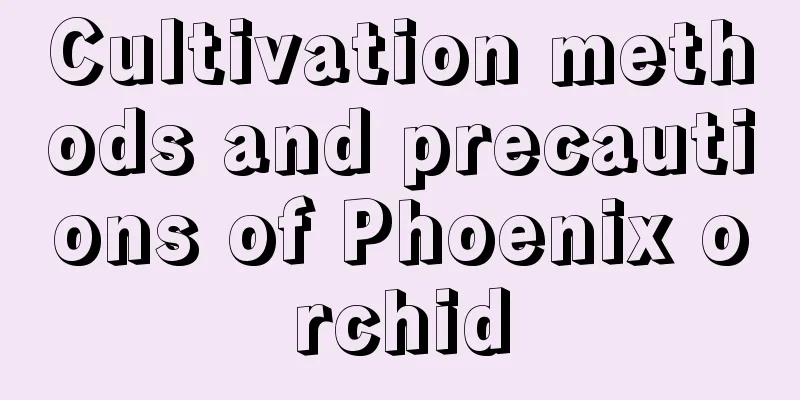Cultivation methods and precautions of Phoenix orchid

How to cultivate Phoenix orchidSoil and FertilizationIf it is a potted plant, the commonly used soil is a mixture of leaf mold and coarse sand. When the pot needs to be changed in spring, the old soil at the roots of the plant needs to be removed, and then the dead roots and rotten roots need to be cut off. When new leaves grow, the old leaves also need to be cut off. Organic liquid fertilizer can be applied once or twice a month during the growth of the plant. WateringThe plant Phalaenopsis is relatively drought-resistant and can generally grow well as long as it is neither dry nor wet. However, it should be noted that it must be watered sufficiently in the summer, and it is best to spray the leaves every day and maintain a high air humidity so that the leaf color will be more beautiful. Generally, the Phoenix orchid stops growing after entering winter, so it is necessary to control water and apply fertilizer. Growth environmentPhoenix orchid grows well in a warm, humid and sunny environment. It is drought-resistant, cold-resistant and shade-tolerant. It is not very demanding on the soil and has strong adaptability. Precautions for breeding of Phoenix orchidDiseases and their preventionCommon diseases and pests of Phoenix orchid are leaf spot and leaf spot. If it suffers from the above two diseases, you can spray it with 1000 times diluted 0% methyl thiophanate wettable powder. Pests and their controlCommon pests of Phalaenopsis include scale insects, whiteflies and fall moths. If infected with the above pests, spray them with 1000 times diluted 40% oxydemeton-methyl emulsifiable concentrate. The above are the cultivation methods and precautions for Phoenix Orchid. If you cultivate it carefully, you will definitely reap rewards! |
<<: Differences between Catalpa ovata and Catalpa spp
>>: Shell flower blooming period
Recommend
Can I plant camphor trees at home?
Can I grow camphor trees at home? You can plant c...
How to divide bamboo cypress into pots so that it can survive easily
When is the best time to divide the bamboo cypres...
How to make the Brazilian wood grow fast and strong
1. Suitable soil When cultivating the rubber tree...
An experienced flower farmer told me that if I cut dying flowers twice like this, they will be guaranteed to come back to life in three days!
Clivia Summer is here, and many places have enter...
The correct way to change the pot and soil of Bougainvillea
After caring for bougainvillea for a few years, m...
How to behead the Dripping Guanyin
1. Prepare tools First move the problematic dripp...
Can hydrangeas be exposed to the sun? What should I do if they wilt in the sun?
Can hydrangeas grow in the sun? Hydrangeas can be...
How to grow green radish in water
1. Prepare tools If you want to grow hydroponical...
How to grow sweet potatoes to get high yield?
Sweet potato is a kind of whole grain that many f...
The succulents in her home have gone through a lot of changes, from ugly and green to beautiful. What has they experienced?
The little one grows up Most flower lovers are at...
Factory-scale farming technology of Penaeus vannamei
Factory-based farming has very high requirements ...
Do chrysanthemums like the sun?
Chrysanthemums like the sun Chrysanthemum is a su...
How to take care of the newly bought Jinhuangxing
1. Soil First observe the condition of the pottin...
Time and method of changing soil for Molan
Time to change the soil of Molan The soil of Mo L...
Cultivation methods and precautions of azalea
Rhododendron has relatively few velvety roots and...









